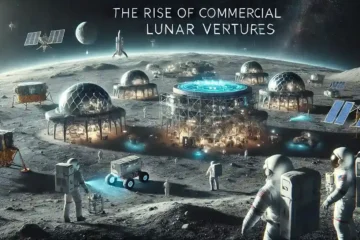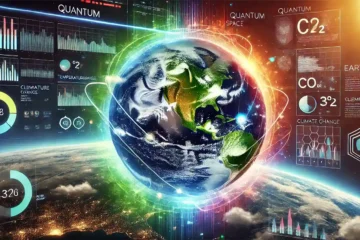Aren’t such star gazes ever made tempting by the thought about how it can be imagined into a much more gigantic and more enigmatic universe full of interrogation here down low? Researchers are barely ever waiting to help. Amongst the huge puzzlers of the universe, one is dark energy.
This unseen energy is estimated to cover almost 68% of the universe, but remains mysterious to us. One of the pretty mysteries to arise from dark energy is whether this energy may travel beyond the speed of light.

In this article, we will learn about the concept of dark energy and its function in the universe, as well as whether it can transcend the speed of light.
let us begin!
Unveiling Dark Energy
The force causing the accelerating expansion of the universe is termed as “dark energy.” The concept came into being between the years 1997 and 1998 when independent astronomers conducted research on distant supernovae, found their brightness below expected measures, and further found that the universe was expanding and at an ever-accelerated rate.
The Mechanism Behind It
To analyze dark energy, first the very method in which the universe is behaving needs to be examined. It all began about 13.8 billion years ago with the Big Bang when everything within the universe began to set itself in motion.
Time will go by, and over massive distances – because of gravity – clumps of matter will make stars, galaxies, and many other structures. However, the very recent data collected indicates not only that the expansion of the universe continues but is accelerating, which means that there must be some force opposing gravity. This is where dark energy comes into the picture.
Speed of Light

Gravity travels close to 299.792 kilometers per second (186,282 miles per second) in space. In Einstein’s original formulation of relativity, he defined speed as not more than that of light. This assumption also turned out to be one of the more critical aspects of modern physics and has undergone several empirical validations.
Why the Speed of Light Matters?
Light speed is much more than a unit of measure; it shows how fast light travels. And this is how it really helps understand space and time. Approaching light speed, objects tend to get heavier and require more energy input agitation to further accelerate that object. Hence, according to what physicists know, no one with mass can travel at or faster than the speed of light.
How Dark Energy Influences the Universe’s Expansion
Dark energy, currently defined as a broad and apparently indefinite space, among other things, does really raise the question: Can dark energy move faster than light? This, however, is one of many mysteries that dark energy still holds – what it really is or may turn out to be remains open to much speculation.
How Fast Is the Universe Expanding?
In the dry esoteric tone of cosmology, the Hubble constant claims to measure the expansion rate of the universe, which basically means the speed at which galaxies recede from us. Some such recent incursions into the world of measurements have suggested otherwise-that the expansion is, in fact, accelerating, and hence the burning question of dark energy ,a pretty hard sell, gets put right back into context.
Is Dark Energy Capable of Surpassing the Speed of Light?
However, it is only after enumerating all these points that one would go on to speak about the expansion of the universe. For it is very important to know that it is space that expands, while the objects within space do not move in it. With the expansion of size, the distances between the different galaxies increase. This is an expansion that might be so high as to make even far-away galaxies seem to be moving away faster than the speed of light. This does not break any known physical laws since it is not that the galaxies are moving away from one another within space; instead, it is space that is expanding in between them.

Further Insights into the Concept of Expanding Space
Arguably, the most severe yet unexplained mystery concerning dark energy is whether or not it can travel faster than the speed of light. Whatever dark energy is, in the present sense of interpretation and in cosmology generally, it defines itself as space rather than as an object traveling somewhere like light or matter.
Dark energy is thus almost antagonistically identified as a repulsive force for further increasing the universe, per se effacing galaxies. It emerged, according to astrophysicists, approximately five billion years after the Big Bang, and has subsequently thereof been the most pronounced factor for the past five billion years. However, this crisis does not bring closure to the topic of all those unsolved mysteries about dark energy. Perhaps the biggest mystery among them is whether or not dark energy can bend the light barrier.
Consequences of Superluminal Expansion
To evaluate the effects of dark energy or superluminal expansion of the universe, it makes sense to take into account the phenomenon called cosmic inflation. This theory posits that immediately following the Big Bang, the universe underwent a very brief period of rapid expansion; within an incredibly small amount of time, it became self-evident that the universe expanded to such an extent. Seemingly, even at this quarter of time, some sections of space may have moved faster than as referred to by us as an absolute light speed, according to present understanding about how this universe is.
The Horizon Problem
Additionally, the horizon problem is considered one of the tough aspects in cosmology since it was not solvable because of the fact that the cosmic microwave background radiation is at present available within any point around the universe because it is that isotropic. Indeed, that uniformity implies that some parts of the universe which today are at immense distances from each other were once close enough to one another so as to be in physical contact. Inflationary cosmology did not solve the problem, since superluminal expansion at the very early time made sure that no region in the early universe matched up with those parts that were separated in the final universe.
Theories and Conducting Experiments
Most popular theory is the cosmological constant which was first introduced by Albert Einstein in his field equations of gravity, and says that there exists a uniform energy density in space.
Another set of theories has a different kind of model modification in general relativity: quintessence theory holds that dark energy is not constant, but evolves through time, whereas phantom energy states increased density of dark energy in time that will cause a case called “Big Rip”.
Current Studies

Dark energy is a topic of study of the scientists and has brought about the method which is:
Supernova observations. Through this, astronomers can measure the rate of expansion of the universe at various epochs by looking for the records of supernovae in the very distant past.
Galaxy surveys. An exhaustive survey of galaxies gives a hold on their activity and positionality, which can be extrapolated to have an effect of dark energy.
CMB. Studies in CMB perhaps give details of dark energy as well as an earlier stage in the universe.
Conclusion
Dark energy is indeed the most persistent mystery of the universe as it is responsible for its acceleration of expansion and at the same time contradicts the most fundamental laws of physics. Although one cannot exactly comment whether dark energy is able to pass light speed, the source points to the mystery of space, time, and forces at work in the universe.
Thus, although they are relatively new for research in cosmology, these methods of adjustment mechanics actually provide much deeper insight about dark energy. They will also bring us nearer to determining its value and role in space, not only transforming the conditions found in the universe but also transforming the other cosmic enigmas for us to hope to solve in understanding dark energy and the forces at work in the universe.
FAQs
What is dark energy?
Dark energy is an unknown force responsible for the accelerated expansion of the universe, making up approximately 68% of its energy content.
Can dark energy move faster than the speed of light?
While the expansion of space can cause galaxies to appear to move away faster than light, this does not violate the laws of physics as space itself, not the galaxies, is expanding.
How does dark energy influence the universe’s expansion?
Dark energy is believed to be the force driving the accelerated expansion of the universe by opposing the gravitational pull between matter.
What are some theories explaining dark energy?
Theories include the cosmological constant, quintessence, and phantom energy, each offering different explanations of dark energy’s behavior over time.




